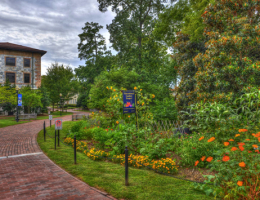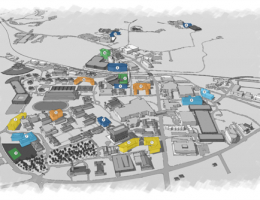Experience sustainability on Emory’s campus, and help us achieve our ambitious goals. From the moment visitors step onto Emory’s campus, you play an important role in our national leadership in sustainability.
Acknowledging the ancestral peoples and land
Emory’s Office of Sustainability Initiatives acknowledges the Muscogee (Creek) people who lived, worked, produced knowledge on, and nurtured the land where Emory’s Oxford and Atlanta campuses are now located. The Muscogee people were forcibly removed from states like Georgia and Alabama during the Trail of Tears relocation (1830-1838), a shameful part of our history when the federal government forced Indigenous peoples across the region to leave their ancestral homes. In 1836, Emory University was founded on part of this land. It is important for us to acknowledge, honor, and respect the land we now call home; to further recognize the inherent intersections between Indigenous rights, sustainability, and the environment; and to continue to strive for justice and recognition for Indigenous communities.
Read Emory’s official Land Acknowledgement and learn more here.
GET AROUND GREEN
- Follow our sustainability maps to plan your trip and find your way around the physical experience.
- Understand how to get around campus without having to ride our biofuel powered shuttles.
- Learn about our No Idle Policy, where to charge your electric car or find alternative fuel.
KEEP IT SUSTAINABLE
- In June 2021, President Gregory L. Fenves signed the ‘Break Free From Plastic Pledge‘, which aims to reduce unnecessary single-use plastics on Emory’s Atlanta and Oxford campuses by 2026. Students can do their part by limiting the amount of Styrofoam, plastic bags, plastic straws, and other single-use plastics that they consume. In most cases, these products are brought onto campus in the form of takeout food packaging.
- Find out what to do with your trash (recycling, composting) while visiting Emory facilities, and learn how you can help us achieve zero landfill waste.
- Visit the award-winning Water Hub and get a tour from a student docent.
- Enjoy locally and sustainably sourced food in our cafes and coffee shops, visit our educational gardens, and get a snack at the Emory Farmers Market.
LEARN MORE
- Get more details by reading the Emory Sustainability Vision and Strategic Plan.
- Sign up for the Office of Sustainability e-newsletter; follow us on Facebook and Twitter.
Helpful Documents and Links for University Visitors
| Title | Initiative | Type | Description |
|---|---|---|---|
| 2019 Annual Energy & Utilities Report | Energy, Water | Documents & Reports | In 2019, Emory continued to make progress on its 2025 Sustainability Vision goals to reduce energy use per square foot (EUI) by 50 percent and overall energy consumption by 25 percent by 2025. |
| Emory University STARS Report | All Initiatives | Documents & Reports | The Sustainability Tracking, Assessment & Rating System (STARS®) is a transparent, self-reporting framework for colleges and universities to gauge relative progress toward sustainability. STARS was developed by AASHE with broad participation from the higher education community. |
| Emory University Waste Management Policy | Waste | Documents & Reports | Emory’s vision is to be a model of transformative practices and sustainable choices at every level. Given Emory University’s 2025 Sustainability Vision and commitment to divert 95% of its waste from municipal landfills, this University-wide policy establishes those infrastructure and behavioral changes necessary to achieve this goal. |
| Emory’s 2023 Climate Action Plan | Climate Solutions | Documents & Reports | Emory's most recent climate action plan offers recommendations to guide Emory on its path to net neutrality by 2050. |
| Idling Reduction Policy | Climate Solutions, Transportation | Documents & Reports | As part of Emory's Sustainability Initiatives, we have developed an idling reduction policy for Emory University that provides operating guidelines for Emory University vehicles and all service and delivery vehicles and freight carriers operating on Emory University property. |
| Institutionalization of Change: A History of Emory University’s Office of Sustainability Initiatives by Kristen Kaufman | All Initiatives, Operations | Documents & Reports | Read about the founding of the Office of Sustainability Initiatives in 2006, both the logistical aspects— OSI's staffing and governance structures— and programmatic aspects— creation of the Sustainability Incentives Fund, website, campus policies on transportation & water, strategic plans, and other efforts up to 2017. [Keywords: history, policy, staffing] |
| Recycling and Composting at Emory University | Waste | Guides | Landfills have negative social, economic, and environmental impacts on neighboring lower-income, historically disadvantaged communities. Landfills contribute to greenhouse gas emissions and can leak harmful toxins into the surrounding environment. Learn about recycling and composting at Emory with this helpful brochure! |
| Sustainable Healthcare at Emory University by Lauren Balotin | Wellbeing | Documents & Reports | Learn about initiatives within Emory Healthcare to address sustainability concerns, including waste reduction, energy & water conservation, sustainable hospital food, and the Sustainability in Health Sciences Task Force. [Keywords: sustainable healthcare at Emory, hospital recycling, hospital food] |
| Teaching the Future: Academic Infusion of Sustainability at Emory by Meggie Stewart | Academics | Documents & Reports | This report reviews the emergence of courses and research around sustainability at Emory, namely the evolution of the Human and Natural Ecology Program into the Environmental Studies Department, then the Environmental Sciences Department. The histories of the Piedmont Project & Piedmont TATTO program, sustainability minors, and the Sustainability Faculty Advisory Council are outlined as well. [Keywords: Emory history academics, sustainability history academics, Piedmont project] |
| Zero Waste Ambassadors Charge Fall 2022- Spring 2023 | Waste | Documents & Reports | The ZWAs are a group of student, faculty, and staff volunteers, who are actively willing to champion waste management and reduction in all areas of the Emory experience. They strive to promote a culture at Emory that prioritizes reducing and diverting waste in all decisions that we make as individuals and as a community. You can read more about specific goals of the program this year in the charge. |





